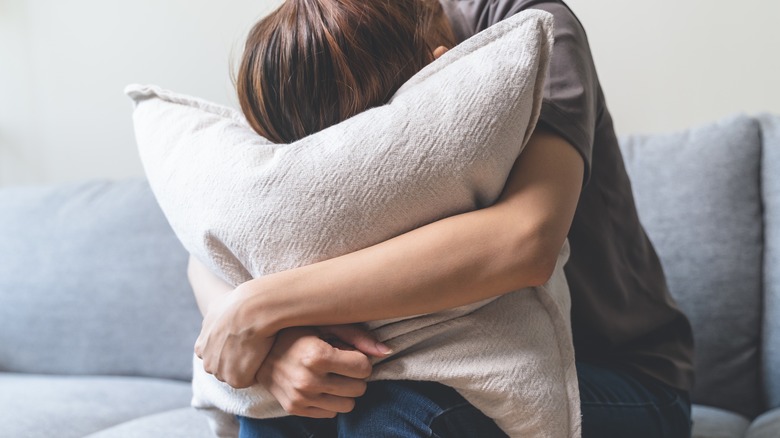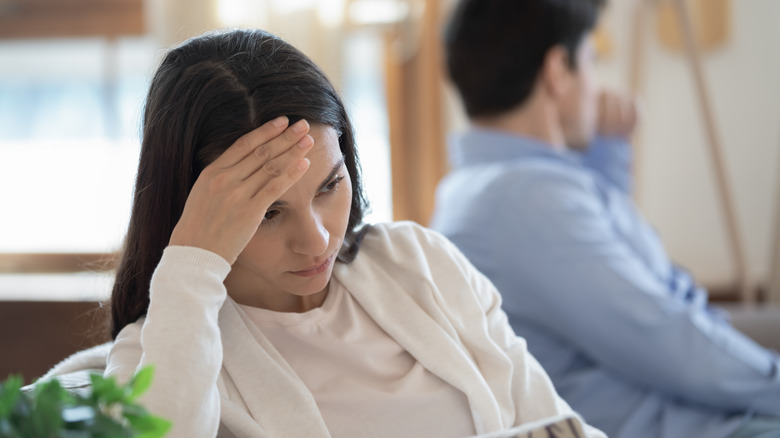The Way You Handle Your Feelings Says A Lot About Your Emotional Availability
Life is full of ups and downs, good days and bad days, and with that can come a range of emotions. When strong emotions, especially uncomfortable ones like sadness or anger, start to become overwhelming, you may wish you had a dial to turn those big feelings down. That, in a nutshell, is what it's like to deal with emotional unavailability.
Irene Fehr, M.A., a sex and intimacy coach, explained to Shape: "'Emotional unavailability' is a catch-all phrase describing a state of not being in touch with your own emotions and/or being willing to show them to someone else." She continued, "It's as if there's a wall between you and other people that prevents emotional information and experiences from leaving — and also going in."
Put another way, emotional unavailability involves numbing yourself so you don't feel any highs or lows. It may also mean avoiding emotionally triggering situations. This is especially common in dating and can make it nearly impossible to maintain healthy romantic relationships, according to Healthline. To determine if you're emotionally available or not, the first place to look is how you handle your feelings.
This is what emotional unavailability looks like
We all experience a wide variety of feelings throughout our lives, but people who struggle with emotional unavailability may be quicker to shut those emotions down. So, how do you know if you're emotionally unavailable or just good at managing your feelings? Relationship consultant Stephanie Mintz, MA, LMFT, clarified to Men's Health: "If a person is emotionally unavailable in general, they won't express emotions with anyone." Likewise, you may also feel uncomfortable or even react negatively when others share their feelings.
Cutting yourself off from your emotions often goes hand in hand with struggling to understand them in the first place. "If you habitually keep your feelings to yourself or keep them bottled in, never truly revealing them to others, this may be because it is hard to recognize how you are feeling," Dr. Catherine Jackson, a clinical psychologist and neurotherapist, informed Bustle.
On the other hand, those who are emotionally available recognize how they're feeling, allow themselves to sit with the sensations, and take time to process them. Other signs of emotional unavailability include being afraid of commitment, avoiding deep conversations, struggling to trust others, and prioritizing independence — as opposed to healthy interdependence — in relationships, per Choosing Therapy.
How to overcome emotional unavailability
Being emotionally unavailable may stop you from experiencing life to the fullest, especially when it comes to relationships. However, emotional avoidance isn't something that can be switched off overnight. Typically, it's a deep-rooted coping mechanism that will take serious time and effort to untangle. Dr. Lindsay Jernigan, a licensed clinical psychologist, told PsychCentral that past relationship or familial trauma is often behind emotional unavailability.
"Staying emotionally distant serves a self-protective purpose in these cases," she noted. "If I don't have to feel, then I don't have to feel pain, and if I don't feel too close to you, then I'm not particularly vulnerable to having my feelings hurt by you." Working through these issues with a mental health professional can be a good starting point. For those who haven't experienced extensive trauma, Healthline suggests pinpointing the cause of your emotional unavailability, like a breakup or depression.
Then, begin facing your feelings on your own, such as by listening to emotional music or keeping a journal of your feelings, before slowly opening up to others. Remember, emotional unavailability isn't a fixed personality trait — it's a defense mechanism that can be unlearned. Embracing your feelings little by little can add a lot of richness to your life, as well as to your relationships.


